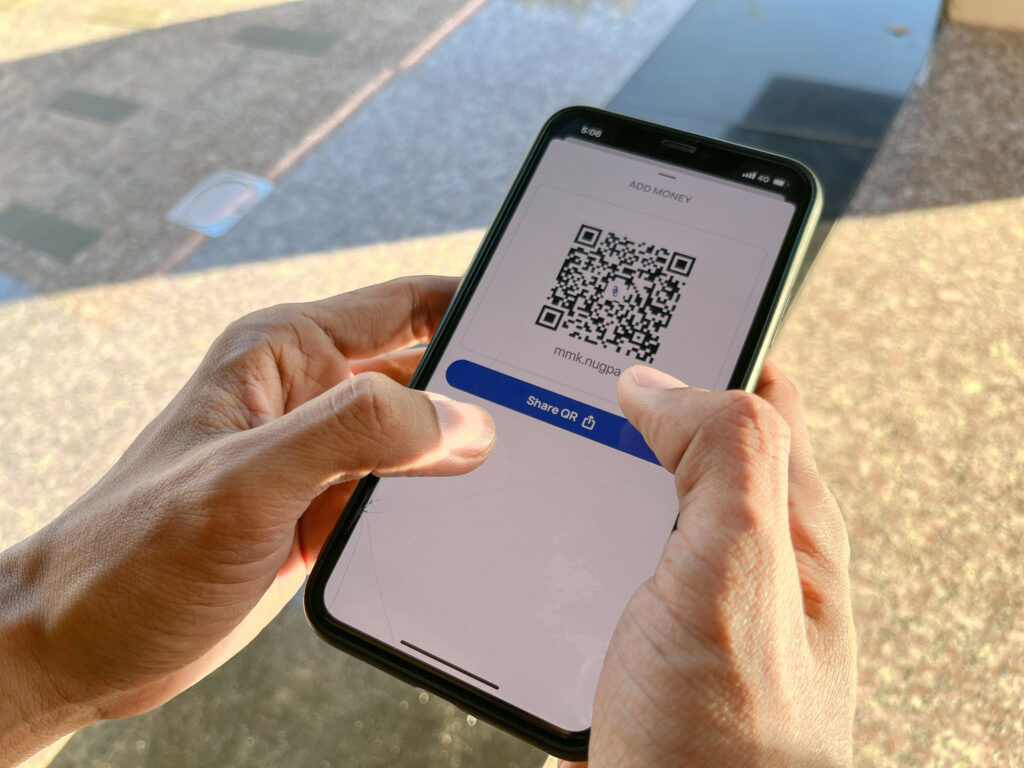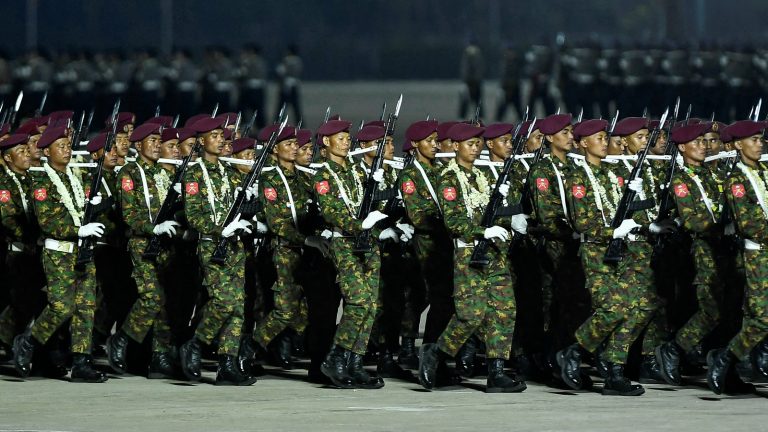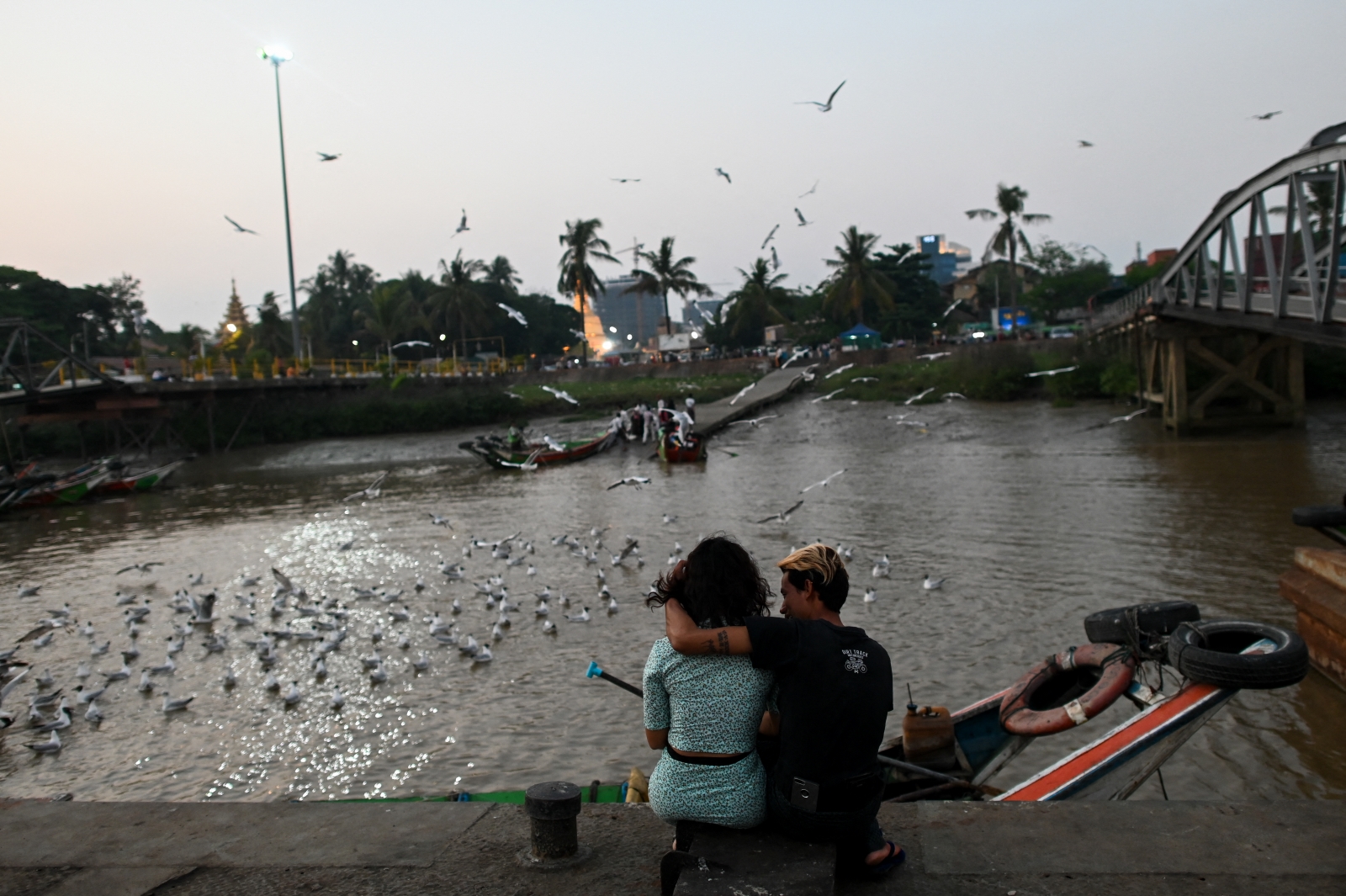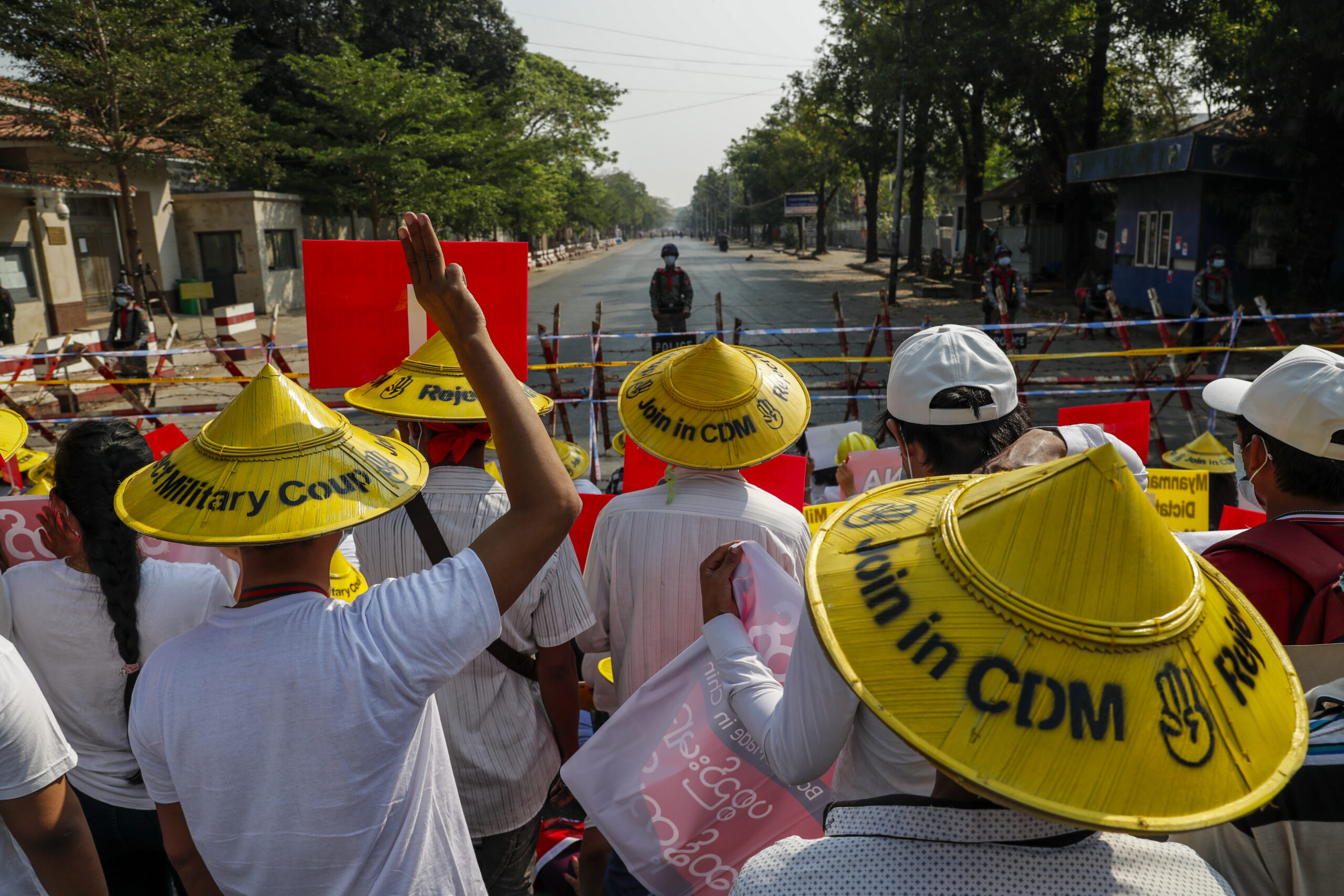Myanmar’s parallel government is funding weapons and public services through a digital currency in a bid to break the junta’s grip on the banks. But progress is slow and the system has weaknesses that could limit its uptake.
By FRONTIER
The war for control of Myanmar is being waged on many fronts, and beyond the clashes on the front lines none is arguably more important than the fight for finance.
Raising funds from the diaspora and getting the money into the hands of resistance groups has become a key objective for supporters of the anti-military resistance.
The military junta retains control of Myanmar’s banking system, and has imposed increasingly repressive controls on transfers and withdrawals in an effort to cut the flow of funds to its opponents.
In response, the National Unity Government, set up by elected lawmakers who won seats in the 2020 election, is adopting innovative ways to finance its military and civilian operations.
To circumvent the junta’s tightening noose on donations flowing from abroad and within Myanmar, the NUG has sought to join the ranks of about a dozen governments worldwide that have created their own digital currencies. Jamaica is the latest, while China’s pilot project, currently reaching about 260 million people, plans to expand to most of the country this year.
Last June the NUG’s Ministry of Planning, Finance and Investment introduced the Digital Myanmar Kyat (DMMK), a digital currency which, in theory at least, is backed by foreign currency. The digital kyat is based on the Stellar network and accessed through NUGPay, a mobile money application launched in pilot form in June 2022 and available for download from Google Play and Apple’s App Store. The NUG announced the end of the pilot in September and said it would embark on a commercial launch soon, but it is unclear if this has yet happened.
Safety the ‘first priority’
Unlike other digital currencies, however, the DMMK cannot be bought and sold easily, as it is not interoperable with bank accounts, exchanges and mobile wallets other than NUGPay.
Instead, DMMK has to be bought from a network of agents, who can be reached through an in-app live chat function. The user transfers foreign currency, kyat – that is, kyat issued by the regime-controlled Central Bank of Myanmar – or Tether, an asset-backed cryptocurrency known as stablecoin, to the agent, and the equivalent amount of DMMK is put into their account.
The junta’s efforts to undermine the NUG, which it considers a terrorist organisation, mean that agents and users have to be on the lookout for regime informants trying to infiltrate the payment system to identify NUG supporters.
Nevertheless, NUG Deputy Minister for Planning, Finance and Investment Min Zayar Oo said NUGPay was playing an important role in moving money into and around Myanmar, where all formal banking channels are under regime control. He said agents were working voluntarily and users did not pay transaction fees.
“We created NUGPay as a means of transferring money both inside and outside the country,” he said, adding that NUGPay “was implemented as the first step in making the financial mechanism of the revolution work. We have plans to go national in the future.”
Although transactions are listed on a publicly accessible ledger, and some sources expressed concern to Frontier over the use of agents to buy and sell DMMK, Min Zayar Oo said safety was the NUG’s “top priority”.
“We brainstormed each step of the process: Will all our people be able to use it? Will it support the revolution? Now it is working out well – not only in Myanmar, but also overseas,” he said. “The safety of our users – of everyone who is involved in this – is our top priority.”
The issuing of DMMK is one of five revenue streams for the MOPFI, along with taxes, bond issues, auctions and the sale of Nway Oo (Spring) lottery tickets.
Min Zayar Oo said NUGPay had more than 20,000 users as of December 14, with 5 billion DMMK issued. According to the Stellar network, which facilitates transfers, this had risen close to 7 billion by early January.
The DMMK is set at par with the kyat. But instead of using the junta-controlled Central Bank’s peg for the kyat, the NUG’s ministry of finance calculates exchange rates with the help of “experts”, the deputy minister said.
On January 3, the DMMK was offered at 2,785 to the US dollar – slightly stronger than the market rate of K2,835 – while the Central Bank’s “reference” exchange rate was fixed at 2,100. Based on the current rate and Stellar data, the NUG has so far issued the equivalent of around US$2.4 million of DMMK.
These figures suggest a relatively limited take-up for the DMMK, but Min Zayar Oo said people are starting to use NUGPay to make purchases. “Now administrative systems are being established on the ground [in the liberated areas]. We have restaurants that accept NUGPay in some NUG-controlled areas now.”
For now, most people are using the digital kyat to make donations to the NUG and armed groups fighting the junta, International Crisis Group noted in a report last month. “The innovative NUGPay system remains embryonic; its success will depend largely on how many users it can attract, and how useful the digital currency turns out to be in practice,” the Brussels-based think-tank said in the report, Crowdfunding a war: the money behind Myanmar’s resistance.
Funding armed groups
ICG estimates that possibly hundreds of millions of dollars have been raised in cash and in-kind for anti-military activities since the coup. Most of the money has been used to support People’s Defence Forces created by the NUG and independent anti-military armed groups, but donations have also flowed in for non-violent activities, such as the provision of services like health and education, humanitarian assistance, and financial support for striking workers who joined the Civil Disobedience Movement.
The challenge facing the NUG is not so much raising money from the diaspora, but moving and accessing it – and this is where it hopes NUGPay can make a difference. Leading fundraisers, including United States-based activist Ei Pencilo, have already adopted the platform as a means of attracting and distributing donations.
Ko Daniel*, a 28-year-old resident of Mandalay, said he started using NUGPay when it launched last June because he wanted to support the NUG. Lately he has used the mobile wallet to receive donations from other users, which he then delivers to PDFs in Sagaing Region and the People’s Police under the NUG’s Ministry of Home Affairs.
“If someone from abroad wants to donate 50,000 DMMK, I hand over my [account details] and I receive the exact total amount in my [NUGPay] account,” he said. “After I transfer the funds, the recipients can withdraw cash from their NUGPay account from an agent in their area … It’s that simple and easy to use.”
“I feel it is safer now to receive donations and funds in NUGPay rather than other mobile wallets, such as KBZPay and WaveMoney, since these are under the control of the military regime,” he told Frontier. “And the transactions are smooth as well.”
One concern for NUGPay users in Myanmar is being caught by police in possession of the app on their phone. But Daniel says that he can quickly delete the app if he needs to and reinstall it later. “The size is only 50 MB, so it is not a big deal,” he added.
He said he was so convinced of the benefits of NUGPay that he had moved most of his savings from KBZPay – a mobile money app offered by the country’s largest bank, KBZ – to his NUGPay account. However, he admitted that he had not personally withdrawn cash through an agent, so could not comment on how easy or difficult it was.
Ko Min Khant, a 24-year-old student union leader from Mandalay who left Myanmar last year for safety reasons, told Frontier that he started using NUGPay in September to raise funds for resistance groups he was working with. He said he feels safe using NUGPay – unlike the financial services under regime control.
“All the capitalist banks in Myanmar, such as KBZPay and WavePay, are following orders from the military junta by providing [the regime with] access to users’ [personal information], shutting down their accounts and seizing their properties,” he said. “So it’s a relief for us that NUGPay has finally been released … We do not trust all those junta-associated banks.”
“The best part is that you can [use NUGPay] … to receive donations from people outside of Myanmar,” he said.
However, Min Khant said there are sometimes delays when the beneficiary tries to withdraw kyat in cash from the wallet, as the process depends on the agent.
“Apart from that, the whole process is smooth. Now, whenever we are raising funds, we tell everyone that we are accepting donations with NUGPay, and people keep pouring money into our account. It’s a lot safer for both sender and beneficiary than other mobile wallets,” he added.
He hopes NUGPay will gain further traction and become used for daily transactions so people no longer have to use banks under junta control.
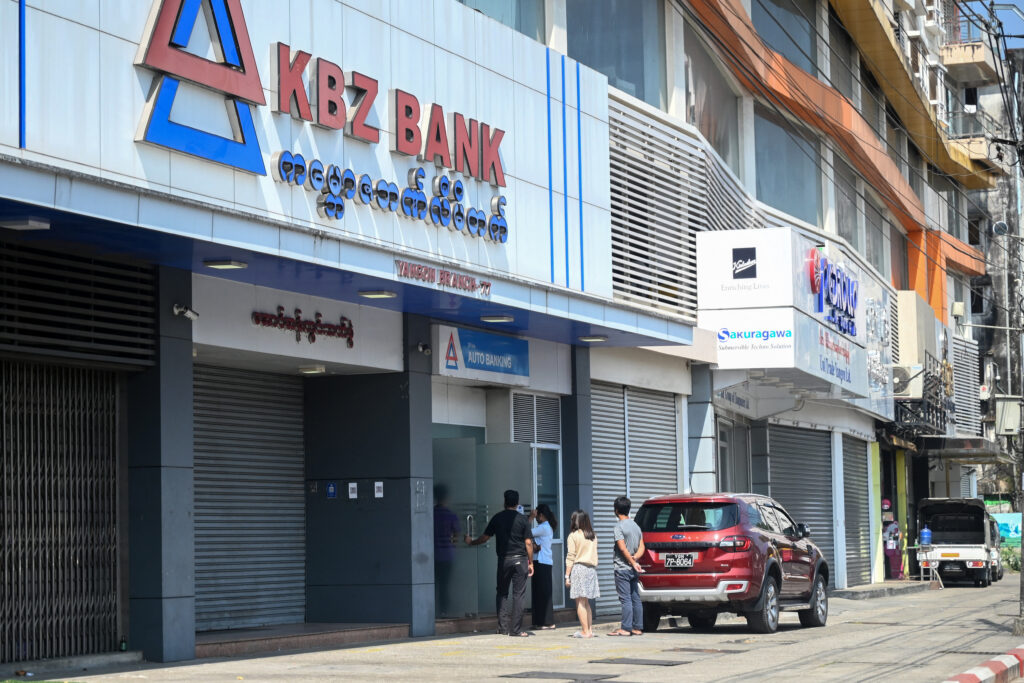
Meet your friendly NUGPay agent
Ko Don Ko, a former senior lecturer in electronic engineering at Yangon’s Thanlyin Technological University, became an NUGPay agent in September 2022.
The 38-year-old joined the street protests after the coup and later left Yangon for the safety of a liberated area. He now manages primary schools under the NUG and raises funds for a variety of causes, including CDM teachers from his former university, pupils who joined PDFs and refugees around the country.
Initially he used his personal KBZPay and WavePay accounts for fundraising, but after these were shut down by the regime he had to open accounts by registering them in the names of his friends. “That is, until NUGPay popped up,” he told Frontier.
Don Ko says being an agent is not an easy job. First, he had to pass many security checks to get approval from the NUGPay administrative team and get a recommendation from inside the NUG.
Most of the NUGPay users he deals with are raising funds and receiving donations through the mobile wallet for the war against the regime. Based on his experience, he feels it is safe, and works well aside from the occasional difficulty accessing it while using a VPN.
The main issue, he said, is that NUGPay only handles DMMK and is not interoperable with other banking services. As a result, users need to go through an agent to buy or sell the digital kyat for any other currency.
“So if you want to buy one million DMMK for your NUGPay wallet, you need to transfer the equivalent to me, the agent, through another service such as KBZPay or WavePay and then I will arrange to give you DMMK into your NUGPay wallet by purchasing it from admins on your behalf,” he explained.
“If you want to buy from an agent based in Singapore, for example, you transfer them 100 SGD and you will get the equivalent amount DMMK into your NUGPay based on the exchange rate set at the time of your purchase date,” he added.
Once an agent receives the funds from a customer, they submit a Google form to the NUGPay operations team requesting the equivalent in DMMK. This is sent to the agent’s account, and the agent then transfers it to the customer. This cumbersome process means buying DMMK can take time; Don Ko said that if a customer needs digital kyat urgently the agent can sometimes get it in advance from another agent, and repay that agent when the DMMK arrives from the NUGPay operations team.
“We all have Google Sheets to keep our daily records – transactions, screenshots of DMMK purchases, details of new accounts and so on,” he said.
If the customer wants to cash out their DMMK, they also need to go through an agent. The agent will transfer the equivalent funds to a non-NUGPay account, such as KBZPay or WavePay, from where it can be withdrawn, Don Ko said.
Because both agents and customers often need to use accounts inside Myanmar to buy or sell DMMK, trust is very important.
Agents have to be careful not to handle transactions for an informant or supporter of the military, because it could result in their non-NUGPay accounts being closed. For Don Ko this is even more of a concern; because his own accounts with junta-controlled banks have been shut down, he uses his friends’ accounts to surreptitiously receive and send kyat for NUGPay customers.
Like many agents, Don Ko only handles NUGPay transactions for people he knows personally, or who have been introduced by a friend. “All the [NUGPay] accounts I’ve opened were for my friends or friends of my friends, including fundraisers and PDFs. I won’t open an account for a stranger,” Don Ko stated.
To make the system smoother and more secure for users, Don Ko suggested they should be able to trade directly with cryptocurrencies such as Bitcoin and Tether.
An opportunity ‘squandered’
But one expert expressed doubt that NUGPay and DMMK could ever become widely used in their current form, because he said they have several “flaws” that reflect “big, fundamental misunderstandings and mistakes in the technical implementation”.
“Just one mistake like that is a reason to doubt that it will be successful,” said Griffin Ichiba Hotchkiss, a cryptography expert who previously worked in Myanmar and is now a researcher with a non-profit foundation that supports a major blockchain protocol.
He told Frontier that the digital kyat “is a long way from being a ‘real’ currency in any sense” because it is not being widely traded. “In order to have what we call ‘exchange’ there needs to be buying and selling. But nobody is really on the ‘buy’ side of the exchange in DMMK – because the vast majority of people ‘buying’ [DMMK] are really thinking about it as a donation. And that’s important, because to actually hold value as a currency, people need to believe in it as money, not as a means to donate to a PDF. Money is based on belief, and at the moment the DMMK doesn’t really have believers in the same way that other currencies do.”
Hotchkiss said one of the “big strengths” of the NUG is that people see it as a legitimate government and believe what it says. “They said ‘this is money’, and then millions of people believed it. I think that’s really an amazing power that they have. [But] yeah, unfortunately, in my opinion, it’s being a little bit squandered.”
He suggested that the NUG establish a ministry or department of digital affairs that could bring together experts who could improve NUGPay and the digital kyat, as well as investigate and develop applications for cryptography and other new technologies.
“It’s not like [NUGPay and DMMK are] their only chance. So I’m hoping that eventually they’ll be able to make it a better-designed currency in the future.”
One digital expert told Frontier in March last year that they and other consultants had held talks with the NUG about the benefits of blockchain technology and stablecoin currencies since late 2021. At the time, the digital expert said the parallel government appeared reluctant to support such schemes despite talking them up in public.
However, a January 15 interview with NUG minister for planning, finance and investment U Tin Tun Naing could give tentative hope to those like Hotchkiss who extol blockchain for its perceived qualities of decentralisation, privacy and security.
“We will make use of blockchain and cryptocurrencies to establish the Spring Development Bank by the end of next month”, Tin Tun Naing told Bloomberg, which also stated that the NUG will hold an “initial coin offering”, suggesting once again that it plans to launch a genuine cryptocurrency.
Digital kyat or digital hundi?
As things currently stand, DMMK and NUGPay operate less like a normal mobile wallet and cryptocurrency, and more like a traditional method of circumventing regime banking controls: hundi.
Hundi is what’s known as an “informal value transfer system”, varieties of which can be found in many countries around the world. Using agents, money can be remitted domestically or internationally, but the money does not move either physically or through the banking system – instead, the agents that handle the transaction usually settle the debt in another way.
According to ICG, much of the money raised for anti-military activities since the coup has been sent into and around the country using hundi, sometimes in combination with formal banking services.
Whether NUGPay can replace hundi as a means of bypassing the regime is unclear, given the apparent limitations of NUGPay and the DMMK.
Interviews with armed groups and fundraisers indicate many resistance groups are using NUGPay to receive donations, but it is not always a practical option – for example, in rural Sagaing Region, internet shutdowns mean that the NUGPay app simply cannot be accessed much of the time.
Ko Thiha, who is part of a resistance group in northern Myanmar, said that neither his nor any other battalion in his force is using NUGPay because there are no agents offering cash-out services.
“The usefulness depends on where you are located,” he told Frontier. “I think it’s mostly used around places like Mae Sot [on the Thai-Myanmar border].”
Ko Nyan*, a 29-year-old member of an urban guerrilla group in Yangon, said safety concerns meant that he and his comrades did not use NUGPay.
“Since we are not associated with the NUG or anyone else, we can’t trust anyone, and using NUGPay would be a safety issue,” he said. “But we will consider using it in the future if we think it will be helpful.”
*denotes the use of pseudonym for safety reasons


